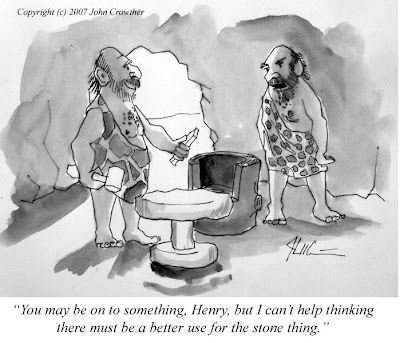Well
..I bet the first person who saw a stone tipped arrow commented that back in his day, firehardened wood did just fine

I think the divide is really, "Can you make it yourself from only the natural resources around you ?".
Since doing so, to make
all of our kit from absolute scratch, would take not only a tremendous amount of work, but time and access to natural resouces too, most of us will just have to rely on bought stuff, and learn as much as we can to file away in the old brain, just incase it comes useful at some point

Besides, it's interesting to know how.
For instance, we know of good iron pre Roman (Over 1000 bce for arms (Hittite armies, etc.,) and good evidence for the use of meteoritic iron over 3000bce. We know how to make it from bog iron, let alone from iron ore or meteoritic sources. Doesn't mean we can make good steel easily though, even though technically we know how the process works. The Chinese had it by 350bce, and good carbon steel by 100ce. Not the speciality of most here however (shout out Sir Dave !) and most just buy it either in sheet, billet or ready made items.
Similarly with fabric. From hemp to linen, cotton, wool, etc.,
I can spin and weave and sew, but I know just how much effort it is to turn plant fibres (and over half the effort is in growing and breaking out those fibres) into good cloth. Most folks just buy it by the metre or as finished items. Put it this way, the cloth I've made myself is too 'valueable' to wear most of the time. Factory made is cheap in both expense and labour.
Leather ? if you've ever processed a hide by yourself, and made good leather, either buckskin or tanned, you will value every single square cm of the stuff. It's damned hard work to make it by hand. Incredibly useful, and one of the reasons that humanity now exists virtually everywhere on Earth. Our own skins are soft and easily damaged. Using the skin of something else as well, as clothing, let humanity expand outside it's original very narrow range.
Again, most folks just buy it, or the finished items.
Woodwork ? well, some of us have cut down trees, processed them, used the material, and if you've done it all by hand, then by heavens you appreciate good steel tools

Can you do it with stone tools though ? Yes. It's even harder to do however, you have to think of the tool differently, it'll chip, snap, shatter if you don't pay attention, and it's slower, and you stop trying for straight lines and allow the timber it's 'organic' shape-ness. Though that followed through right into Tudor times at least.
Keep the accuracy for joints, (and shaped items like bows, arrows, throwing sticks, etc.,) iimmc.
Fire ? or really firelighting I suppose. Can you do it from nothing but the natural resouces around you and no metal tools ?
Yes. I tell you though, I really appreciate a good reliable lighter now, and there's an appreciation for a decent bit of good flint and a good spark giving steel
Sorry to wander the thread a bit, but 'traditional' takes many forms, y'know ?
M


 Y'see tunics (of buckskin or cloth) were the norm for millennia, and until at least the 19th century shirts were made with short placket opening fronts, not full length open up the front with load of buttons and draughts.
Y'see tunics (of buckskin or cloth) were the norm for millennia, and until at least the 19th century shirts were made with short placket opening fronts, not full length open up the front with load of buttons and draughts.